15+ Types Of Referral Programs You Need to Know With Real-life Examples
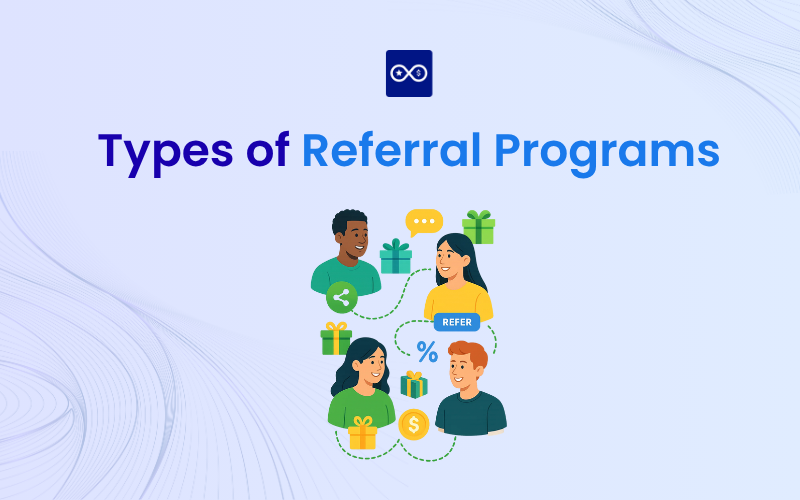
Referral programs are a fantastic way to turn your happy customers, employees, and partners into brand evangelists, driving organic growth without breaking the bank. Whether you’re a small shop or a big enterprise, picking the right type can supercharge your marketing efforts and boost loyalty. In this guide, we’ll break down over 15 types of referral programs, rewards, methods, industries, and business scales, complete with real-life examples to spark your ideas. Explore now!
You may also like:
- Referral Conversion Rate Benchmark 2026 (with Free RCR checklist)
- 60+ Referral Program Examples You Can Copy 2026 (By Industry)
Types of referral programs based on the referrer
Customer Referral Programs
Customer referral programs rely on existing customers to refer new customers, often through unique links or codes. These programs reward the referrer when the new customer makes a purchase, creating incentives for word-of-mouth growth. They help expand the customer base naturally by leveraging loyal customers’ networks.
- Example: Dropbox rewarded users with 250–500MB of extra storage per referral (up to 16GB), resulting in a 3,900% growth in 15 months.
- Unique edge: Referral prompt embedded in onboarding, near 100% exposure, instant virality.
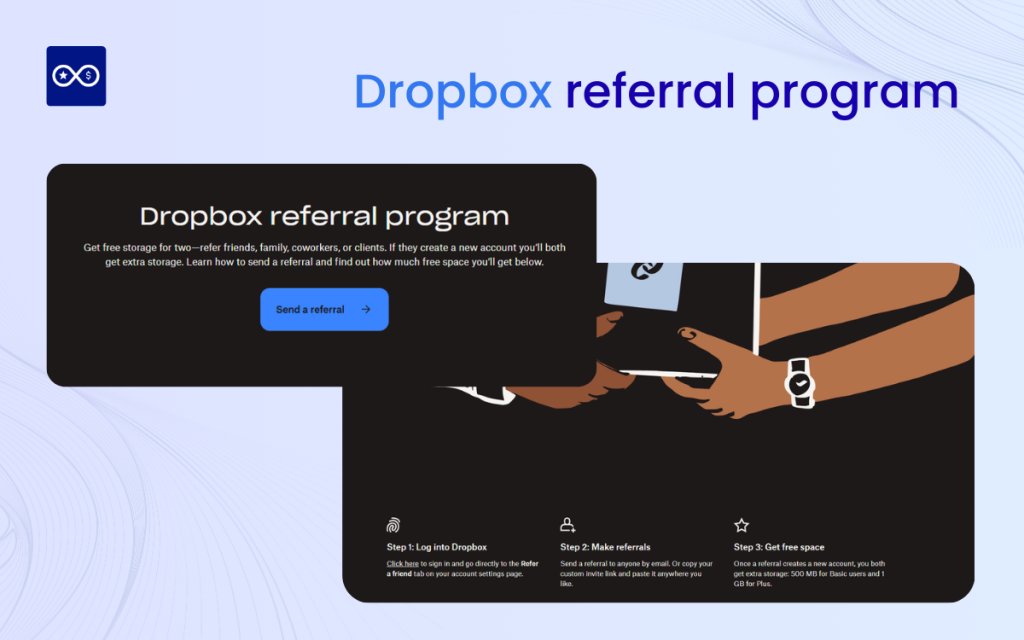
Employee Referral Programs
Employee referral programs encourage employees to recommend qualified candidates for job openings. When their referral results in a successful hire, employees often receive bonuses or other rewards. This approach taps into employees’ networks to find trusted talent and reduces recruiting costs.
- Example: Salesforce pays $2,000 bonuses + team perks for successful hires, driving 52% of new recruits.
- Unique edge: Blends cash with team experiences, turning referrals into celebrations.
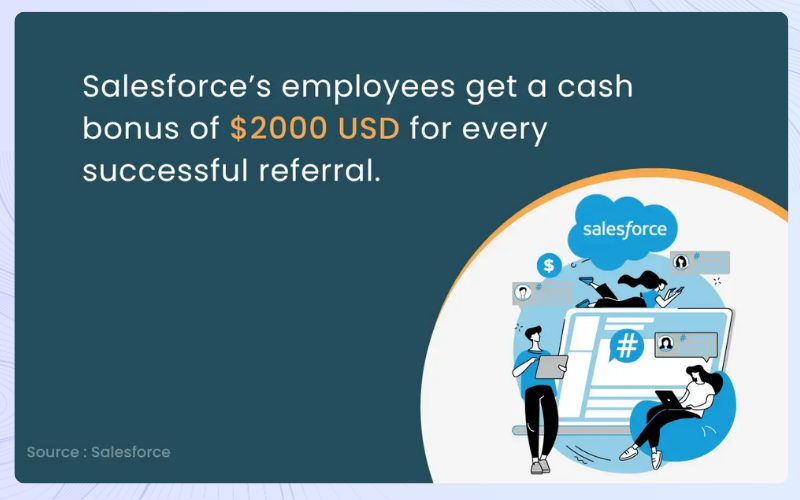
Partner & Affiliate Programs
Partner and affiliate programs involve businesses partnering with other companies or individuals to promote products for a commission or reward. Affiliates earn incentives based on the sales or leads they generate, allowing brands to expand reach through external networks.
- Example: Commissions range from 0% (gift cards) to 10% (luxury beauty), averaging 4-5% for categories like books, supporting affiliates earning up to $126,500 annually and generating billions in revenue.
- Unique edge: Massive scale + effortless tracking, easy passive income for creators.
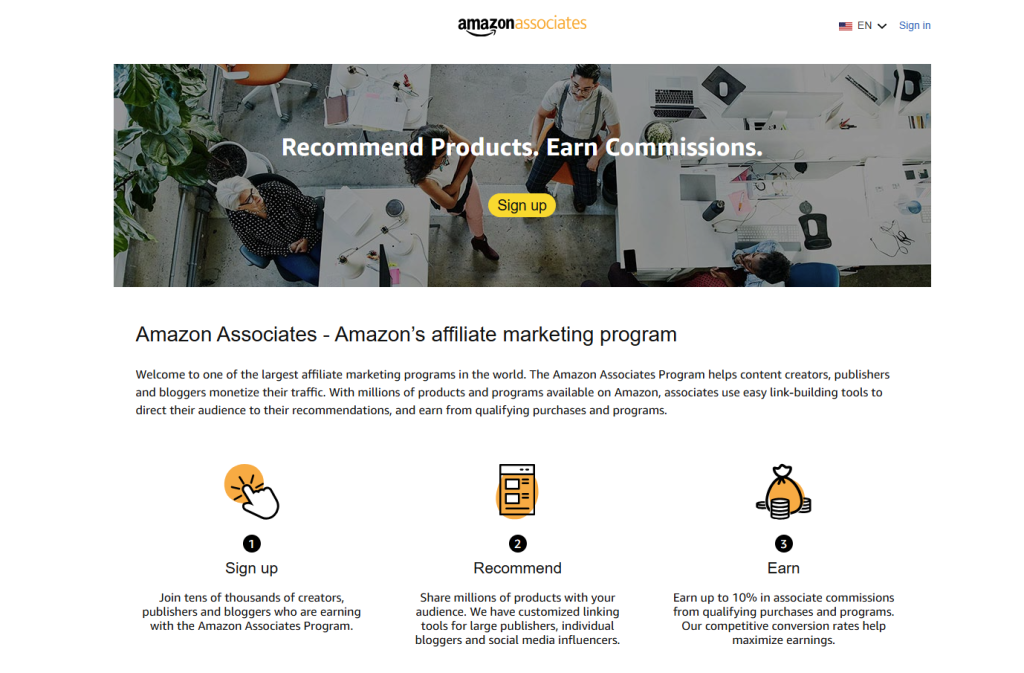
Influencer Referral Programs
Influencer referral programs engage social media influencers to share brands or products with their followers. Influencers use their credibility and reach to drive traffic, referrals, and sales, typically earning commissions or exclusive perks for successful promotions.
- Example: Gymshark’s “Athlete Program” gives influencers commissions through unique codes, helping the brand build a massive global fitness community.
- Unique point: The program feels like a VIP membership, fostering authentic advocacy and loyalty.
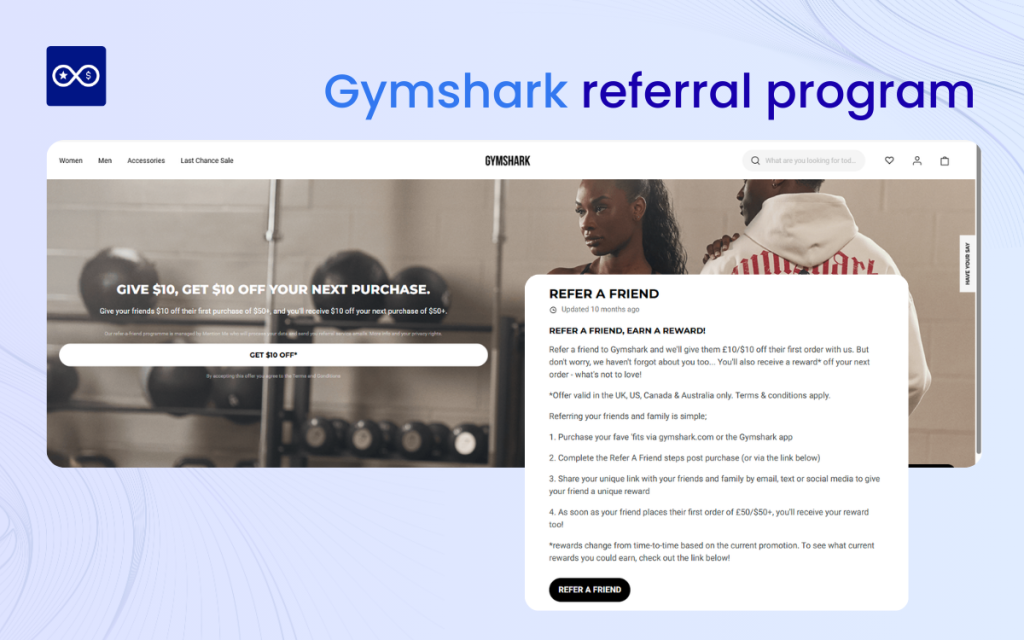
👉 Want to create your own Gymshark-style influencer or ambassador referral program?
With Bloop Referrals & Affiliates, Shopify merchants can easily set up branded influencer programs with custom referral codes, performance tracking, and double-sided rewards. Turn your biggest fans into authentic promoters while automating payouts and campaign insights – all in one app.
Types of referral programs based on reward structure
Standard Reward Programs
Standard reward programs keep things simple by offering the same incentive, like a flat discount or cash bonus to anyone who refers a successful lead. This straightforward setup encourages broad participation without overwhelming choices, making it easy for users to jump in and share. It’s reliable for steady growth, rewarding effort equally across the board.
- Example: PayPal offered $10 to both referrer and friend, which led to 7–10% daily growth and more than 5 million users.
- Unique point: Simple cash incentives that appealed universally and spread rapidly.
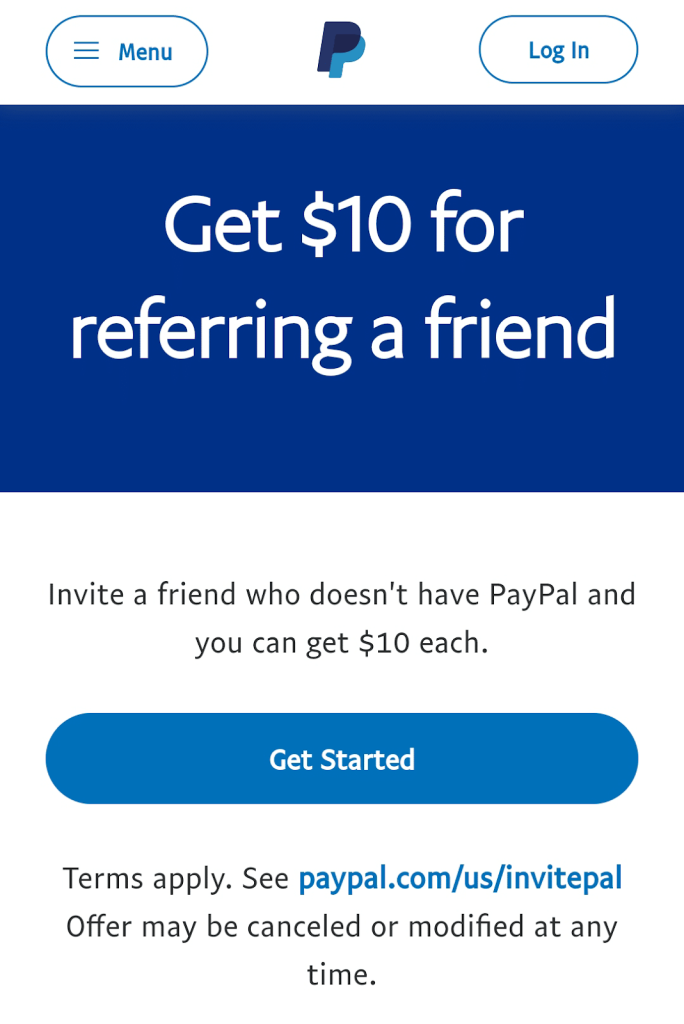
Tiered Reward Programs
Tiered reward programs increase incentives based on the number of referrals made. The more a person refers, the better the rewards they unlock, encouraging ongoing engagement and rewarding the most active advocates.
- Example: Dollar Shave Club uses a points-based tier system, rewarding users with free products and reaching 1.7 million subscribers.
- Unique point: Gamified levels that keep users engaged and continuously sharing.
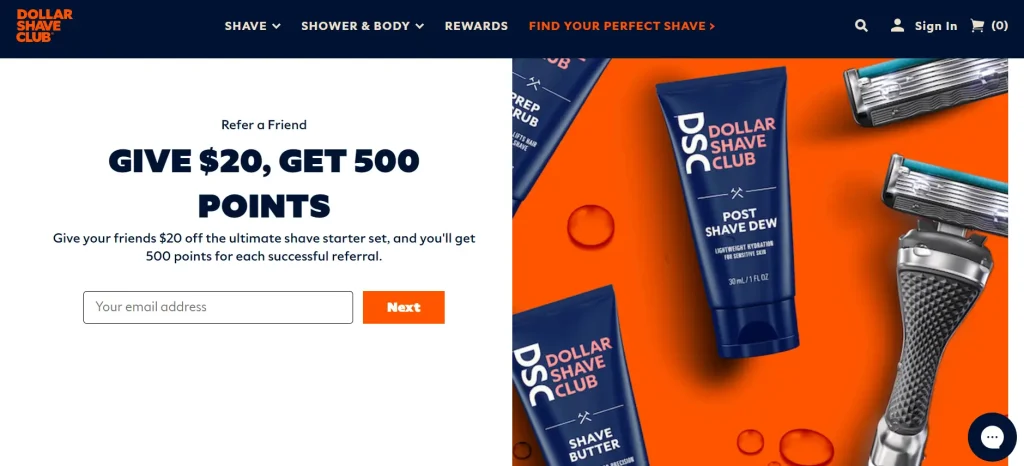
Milestone-Based Programs
Milestone-based programs reward participants when they reach specific referral goals or complete certain actions, often over multiple steps. This helps maintain motivation and keeps referrers engaged longer by offering rewards at different stages.
- Example: Harry’s rewarded customers with gifts like free shave sets after reaching certain milestones, generating 100,000 signups in just one week.
- Unique point: Created pre-launch buzz and community excitement by celebrating progress.
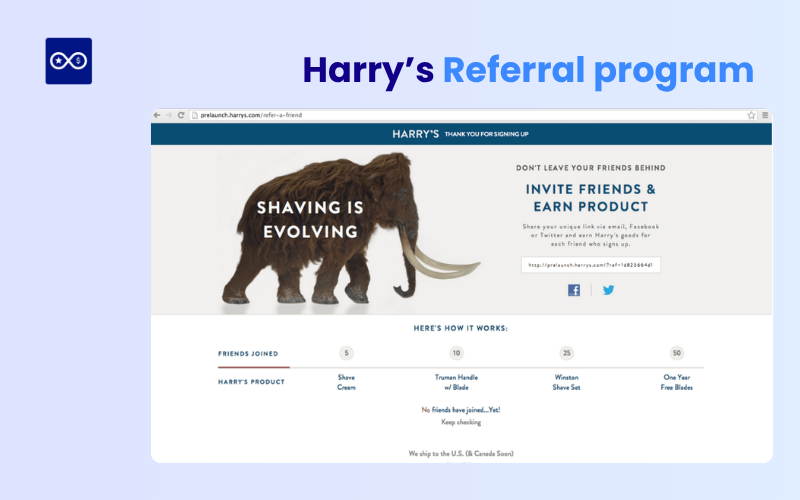
Gamified Reward Programs
Gamified referral programs turn referrals into competitions, with leaderboards and high-value prizes for top referrers within a set timeframe. This adds excitement and urgency, motivating participants to refer more aggressively.
- Example: Tesla offered prizes from $250 credits to free cars, achieving an impressive 119x ROI.
- Unique point: Turned referrals into a thrilling competition that energized its passionate fan base.
Types of Referral Programs Based on Type of Referral Promotion Method
Word-of-Mouth Referrals
Word-of-mouth referrals are the cozy, organic chats where thrilled customers casually recommend your brand over coffee or dinner, no tech required. This trusted, personal touch builds authentic connections and long-lasting loyalty. It’s the gold standard for low-cost, high-impact growth fueled by genuine enthusiasm.
- Example: Organic sharing of Gmail (Google) led to rapid adoption, where 36% of U.S. users discover brands via word-of-mouth (outpacing ads) and 83% are more likely to buy after friend recommendations.
- Unique point: The product’s excellence naturally sparked conversations and organic growth
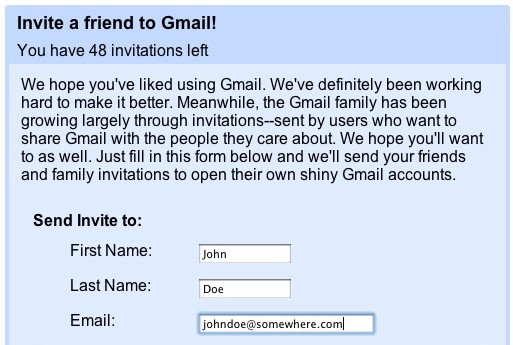
Email Referrals
Email referrals make sharing a breeze by letting customers forward personalized invites or codes directly to their contacts with a single click. This targeted method hits inboxes where decisions happen, keeping things professional yet personal. It’s a timeless tactic for nurturing warm leads efficiently.
- Example: Rocksbox encourages subscribers to refer friends by offering $25 in credit, plus a chance to win an extra $250 when they make referrals within the month.
- Unique point: The limited-time offer creates a strong sense of urgency, motivating customers to share quickly and boosting overall referral participation.
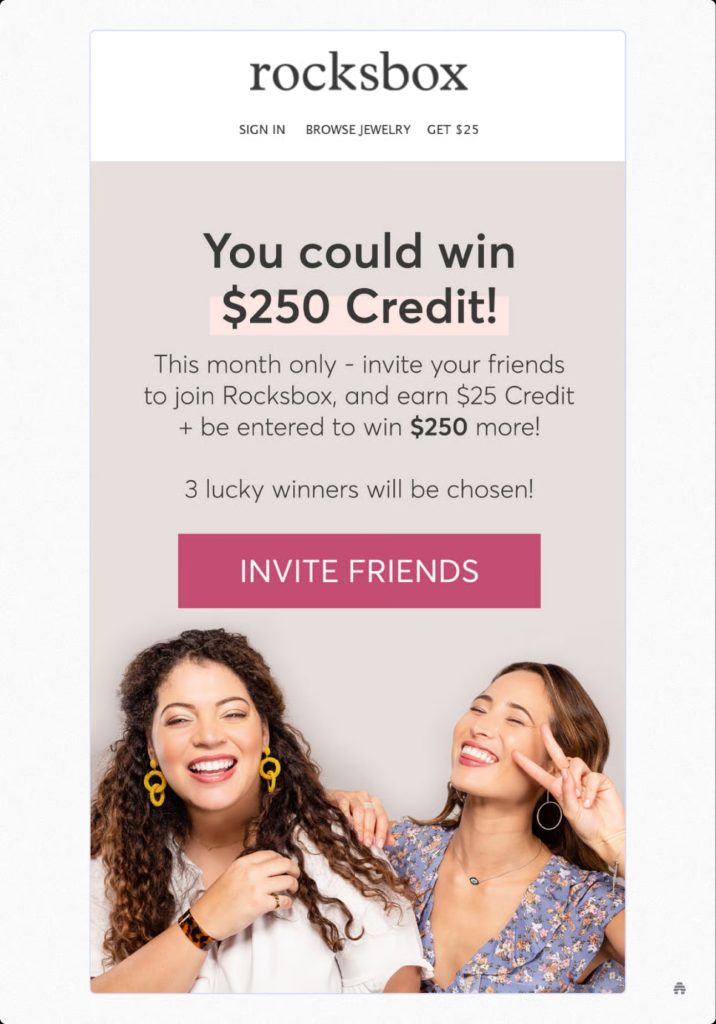
Social Media Referrals
Social media referrals harness the power of shares, likes, and stories on platforms like Instagram or Twitter to broadcast recommendations to vast networks. With eye-catching visuals and easy buttons, it amplifies visibility and taps into social proof. This dynamic approach thrives on trends and community vibes for explosive reach.
- Example: MeUndies gives $20 credit to referrers and 20% off first orders for friends, helping the brand achieve 1,583% growth in three years.
- Unique point: Playful visuals and social-friendly sharing that boost engagement
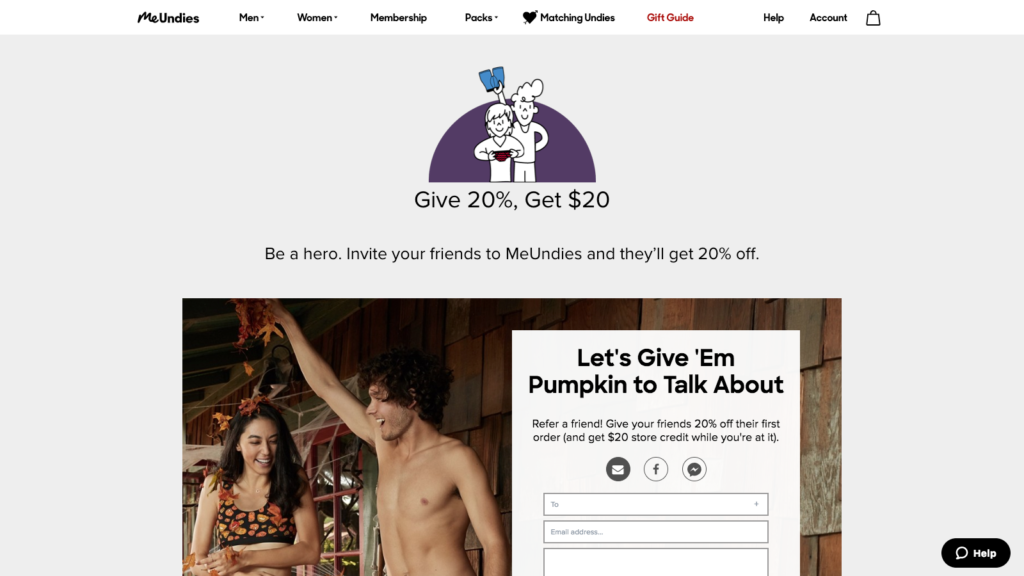
Incentive-Based Referrals
Incentive-based referrals create mutual excitement by rewarding both the referrer and the new customer with perks like discounts or freebies upon completion. This balanced setup fosters reciprocity and lowers barriers to trying your brand. It’s a direct, feel-good strategy that accelerates conversions through shared benefits.
Types of referral programs based on industry
eCommerce Referral Program
eCommerce referral programs shine by integrating seamless sharing into online shopping flows, rewarding referrals with store credits or free shipping on high-volume sites. They capitalize on impulse buys and repeat traffic, turning browsers into buyers via trusted endorsements. Tailored for digital carts, they drive cart value and retention effortlessly.
- Example: Ulta Beauty gives points for referrals, and its loyalty members now drive 95% of total revenue.
- Unique point: Seamless integration with the brand’s loyalty system that keeps customers coming back.
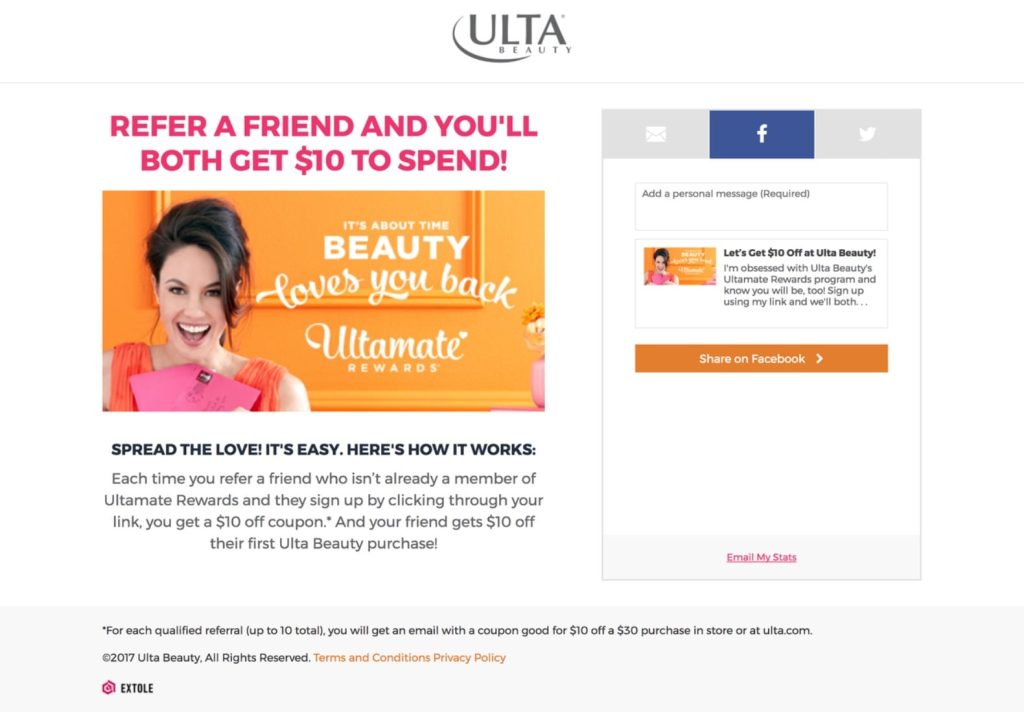
>> Explore: 20+ Referral Program Ideas For eCommerce That Definitely Works in 2026
💡 Running an online store on Shopify?
Launch your own referral and loyalty system with Bloop Referrals & Affiliates. Reward customers with store credits, discounts, or custom perks for every friend they bring in, just like Ulta Beauty does and watch your customer community grow organically through genuine word-of-mouth.
SaaS Referral Program
SaaS referral programs focus on user-friendly dashboards for sharing access links, offering extended trials or feature unlocks as rewards in subscription models. They target tech-savvy networks for quick onboarding and upsells. Perfect for cloud tools, they reduce churn by building user communities organically.
- Example: Canva rewards users with premium credits or 30% commissions, growing its user base to 135 million monthly users.
- Unique point: Built-in sharing that fits naturally into the product experience.
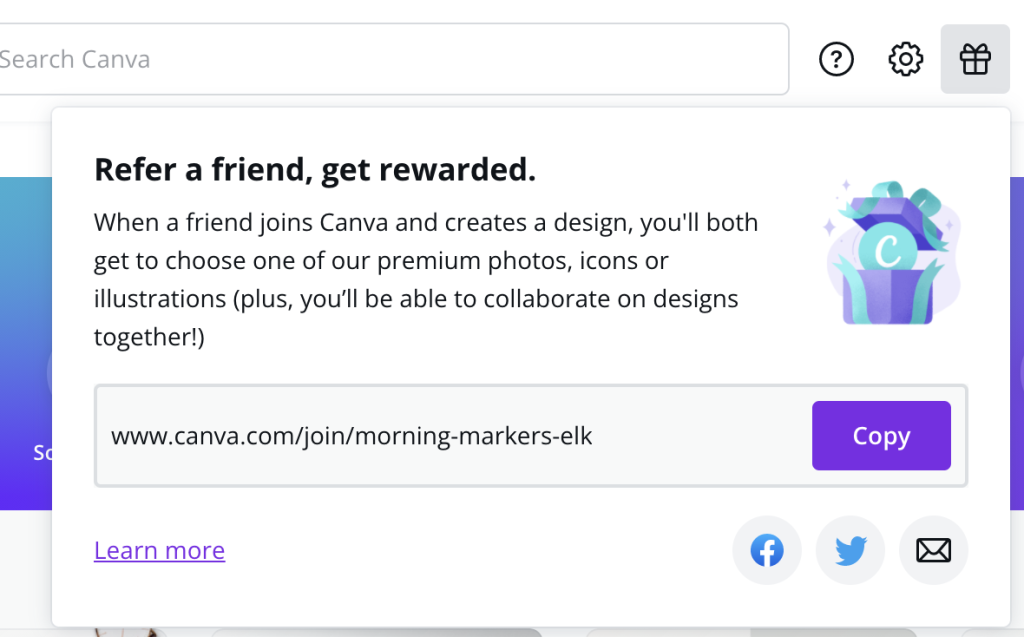
B2B referral program
B2B referral programs focus on businesses referring other businesses, often involving more complex sales and longer decision cycles. These programs typically reward referrals that lead to new contracts or partnerships, leveraging trusted industry relationships to generate high-quality leads.
Real-life example: HubSpot’s partner referral program rewards agencies and consultants for referring clients who purchase its marketing and sales software, fostering strong B2B collaborations.
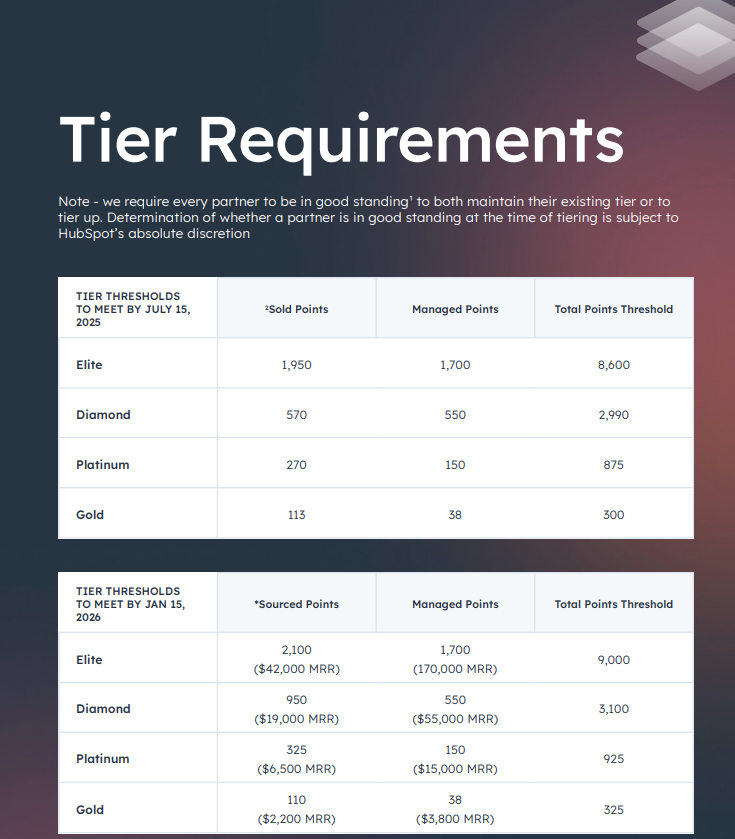
Solar Referral Program
Solar referral programs incentivize green advocates to refer neighbors for installs, with cash bonuses scaled to system size amid rising eco-trends. They emphasize long-term savings and sustainability pitches for high-ticket sales. This niche setup harnesses community trust for energy transitions.
- Example: StraightUp Solar pays $500 to $700 per referral, depending on system size, helping the company grow through local trust.
- Unique point: Scaled cash rewards tied to high-value eco-friendly projects.
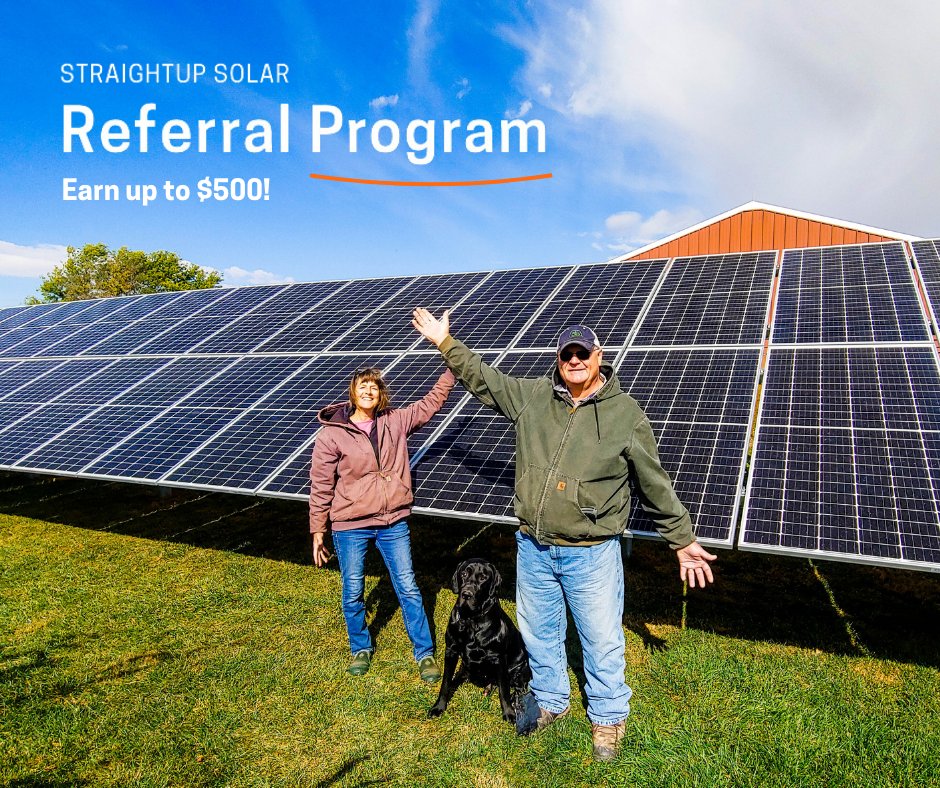
Franchise Referral Program
Franchise referral programs coordinate across locations to reward local referrals with bonuses or leads, unifying branding while empowering franchisees. This networked model leverages community ties for steady foot traffic and hires. It’s scalable for multi-site ops, ensuring consistent growth without silos.
- Example: Weed Man gives customers $100 credits or free services for each successful referral, helping the company expand to 600 territories.
- Unique point: Offers unlimited rewards that motivate both franchisees and local customers.
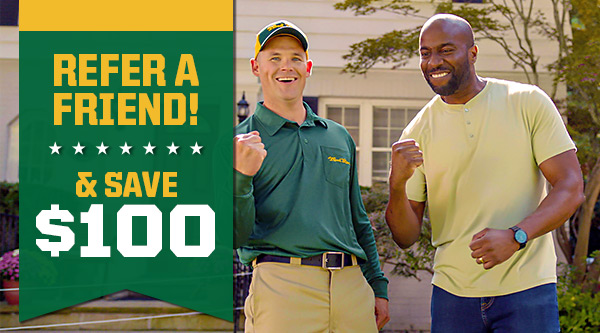
Types of referral programs based on the scale of business
Referral Programs for Small Businesses
Small business referral programs are designed to be low-cost and easy to manage, helping startups and local businesses grow their customer base through trusted referrals in their community.
Real-life example: Local gyms or coffee shops often run simple referral programs giving discounts or freebies to both referrer and referee.
Enterprise Referral Programs
Enterprise referral programs are tailored for large companies with complex sales cycles, often involving referral rewards for channel partners, employees, or clients that bring in high-value business accounts.
Real-life example: IBM runs employee and partner referral programs to help recruit talent and new corporate clients through a structured incentive system.
Referral marketing comes in many forms, and understanding the different types of referral program is the key to unlocking steady, organic growth. From customer and influencer referrals to tiered, milestone, or industry-specific models, each type offers unique ways to reward loyalty and build lasting connections with your audience.
The best part? You don’t need a massive marketing budget to get started. With the right strategy and tools, you can design referral campaigns that feel personal, rewarding, and scalable for your business.
Ready to launch your own referral or affiliate program?
>> Try Bloop Referrals & Affiliates – the all-in-one Shopify app designed to help you create any type of referral program you need. Customize rewards, track performance in real time, and turn your happy customers into powerful brand advocates effortlessly!